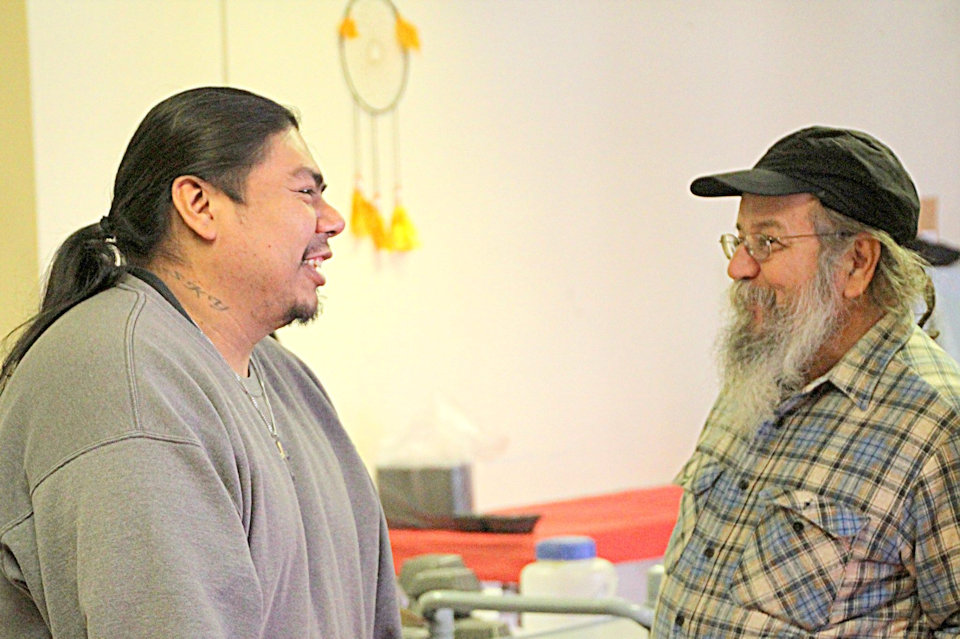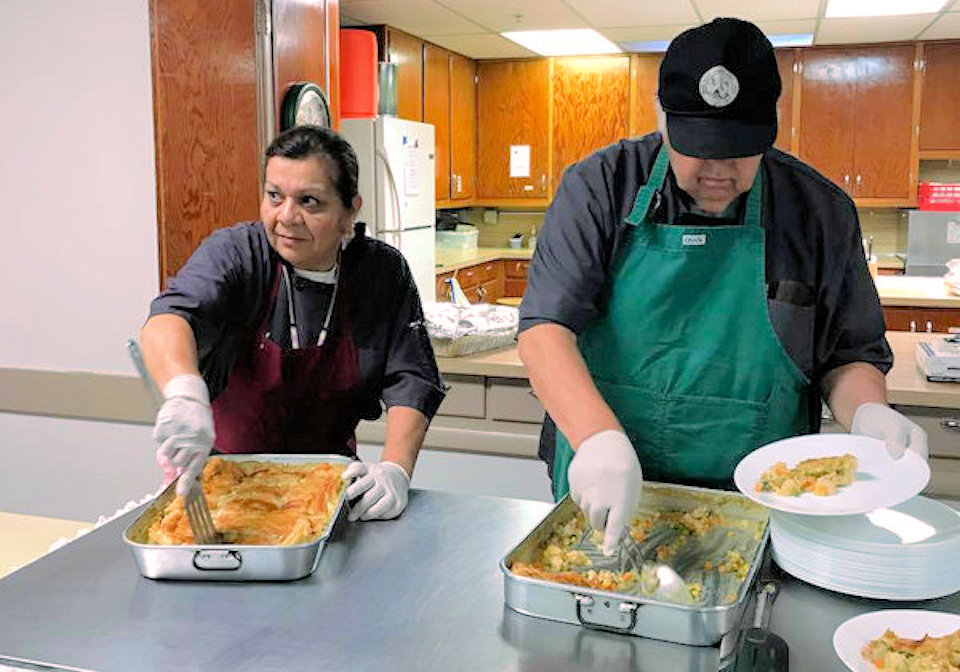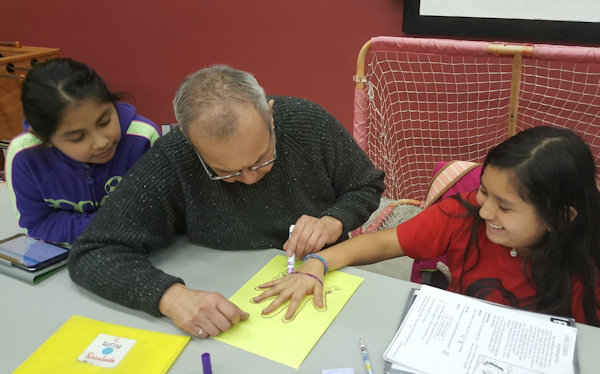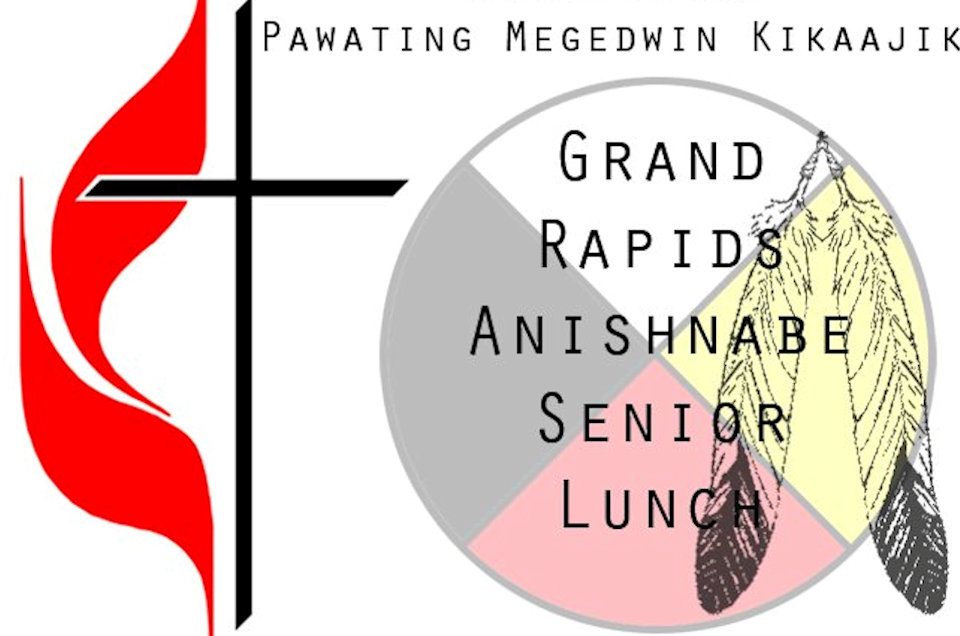Northlawn United Methodist Church offers hospitality to Native Americans in Grand Rapids.
KARIN ORR
Michigan Area Communications
What do three very different ministers, a potluck, and a mid-week worship service have in common?
One church and a shared vision.
Northlawn United Methodist Church in Grand Rapids is the church, the place where the potluck and worship happen; and its pastor, the Rev. Tim Wright, is one of the ministers with vision. The other two are local pastors, the Rev. Sandra VandenBrink, and Native American minister, the Rev. Mike Peters. The vision these three share is a profound respect for Native American spirituality and a deep concern for its preservation.
Tim Wright first became aware of the Native way of worship at Greensky Hill Indian Mission in northern Michigan, where he was assigned after finishing seminary. “I grew up in northern Michigan, in Alpena, and then lived in Boyne City,” Wright says. “There the Native Americans are more integrated into daily life and have more influence than they do in Grand Rapids. Here they are almost invisible as a recognized part of society. You wouldn’t even know this is the second largest grouping of Native Americans in the state [next to Detroit]. Their culture is so oppressed by the system.”

Wright’s northern experience, combined with what he learned in seminary about different worship styles, created a willingness to incorporate Native practices into services at Greensky Hill. “We always said the Lord’s Prayer in Ojibway,” he remembers, ”and sang at least one hymn.” Using the Native language was important, Wright adds, since it had been illegal to even speak a Native language until 1976, when the Native American Languages Act (which addresses the fundamental rights of Native peoples) was approved.
Even more important than the Native practices, however, were their values. “They have a sense of hospitality that is unequalled,” Wright relates. “Everyone is valued equally, men and women, children and elders. And they have a resilience, grounded in forgiveness, that goes with their faith in Christ.”
Wright’s respect for Native ways motivated him and his congregation to welcome a senior meals project, called “PaWaTing MeGedWin KiKaajik Native American Elders Program,” run by the Rev. Sandra VandenBrink. “In Ojibway ‘pawating’ means ‘gathering place for elders’,” VandenBrink explains. The program was started 50 years ago by the Intertribal Council, which has since disbanded. When it became a mission of the West Michigan Conference, it was housed at Plainfield United Methodist Church. Then, when that church was closed, the Conference still wanted to keep the meals program going, and PaWaTing eventually ended up at Northlawn, with VandenBrink as part-time director.
Now, each Tuesday and Thursday noon, elders from many different tribes or nations gather for food and fellowship, games and prizes. Everyone is welcome, Native or not, but VandenBrink reports they have had visitors from as far away as Alaska and Nova Scotia. Besides providing a meal, the gathering is a means of contact for medical services and other issues, a place to talk, share, and build community—a fundamental Native value. Reverend Sandy sees her role in PaWaTing as the background person who offers stability and fulfills administrative duties so the Native people can “discover their gifts.”

One of the many gifted members is Mary Pigeon of the Gun Lake Tribe. A participant in PaWaTing from the beginning, Mary is a self-described “people person” and an excellent fundraiser. Although the use of the church is free, it takes funding to provide the food and prizes that bring such hope and pleasure; and the mission’s budget has recently been cut by thirty percent. “It’s too bad people don’t see who we are,” Mary Pigeon says in reference to the shrinking support. Sandra VandenBrink agrees. “I want everyone to know how wonderful these people are,” she says, “how spiritual. We need to humble ourselves and listen to them.”
A good place to learn and listen is the “Yashana Lodge,” the mid-week worship that meets ‘Wednesday nights in the church basement at Northlawn. “We don’t call it ‘church’,” says Pastor Mike Peters, alluding to the Christian Church’s devastating role in the annihilating of Native American culture. “’Yashana’ is a Hebrew word which means ‘salvation now’, and this lodge is where we study the Bible and learn how the Holy Spirit intersects with our lives,” Peters explains. What makes the service distinctively Native is the burning of aromatics, such as sweetgrass, sage, and tobacco, to “smoke” prayers and the drumming that accompanies dancing and singing.
A member of the Waanakising Odawa as well as an ordained pastor, Peters calls his outreach “Four Fires Ministry.” It is a name that symbolizes the way the three tribes (Potawatomie, Ojibway, and Chippewa), came together, each bringing a separate flame, which they would combine into a common fire. “Then I bring the flame of the Holy Spirit,” Peters adds. Thus the four fires.
Energetic and passionate, Peters leads the service by singing hymns in Ojibway (with phonetic pronunciations provided for visitors). The hymns are accompanied by the enthusiastic drumming of Peters and assembled children—little ones are very much encouraged to be a part of worship. Standing to the side and streaming all of this on FaceBook is Peters’ long-time associate, Kelly Ellis, also Odawa.

A new and exciting venture for the ministry, the FB presentation solves a major problem of Native American ministry: reaching a scattered and amazingly diverse population that is severely under-served. In a recent letter to supporters, Peters reported that over 180 sites, from across the United States to Peru, Mexico, Canada Ireland, and the Philippines, had been able to join in the service via the internet. “They might not ever come into a church,” observes Peters, “but this they can watch.”
Equally successful is the inner city youth ministry of Four Fires, which Kelly Ellis runs. In addition to Bible study, praise and worship, the program offers STEM-based after school tutoring, recreation, arts and crafts. Ellis estimates that in the 25 years she has been with the program, the ministry (which meets at Solomon’s Porch), has reached over 7,000 kids.
These examples bespeak powerful returns on relatively small outlays of resources. Of course the sacrifices that make them possible are made by the visionary leaders who give all they have for little remuneration. Sandra VandenBrink, for example, has never received compensation for the hundreds of miles she travels each week. Rev. Wright and his congregation ask no rent for the use of their building. Yet the rewards are great, beyond price. Pastor Mike Peters and Kelly Ellis wish other churches would see the value of these investments and open their own buildings to Native-run worship.
Even better, suggests Peters, the churches in Grand Rapids could facilitate the opening of a cultural center for Native Americans, perhaps in a church that is no longer functioning. At present, there is no place where Native Americans can gather and share the Holy Spirit in a way that is unique to their culture.
Rev. Tim Wright agrees, suggesting, “that we [the church] commit resources to bring the love of Jesus Christ, justice, compassion, and value to the Native people of Grand Rapids. We are less for missing them; we are not fully who God calls us to be!”
~Editor’s Note: The Senior Meals Program is recognized in the Michigan Conference EngageMI CCMM#3023. Donations may be made online here.
Last Updated on September 20, 2022

